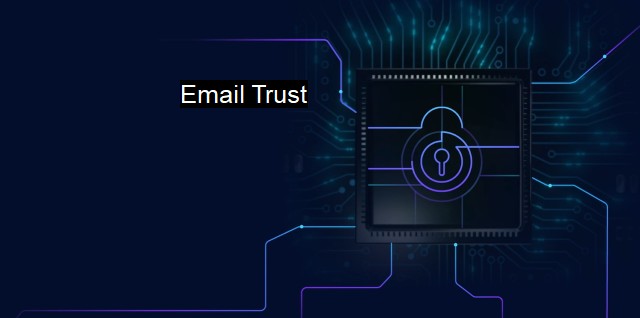What is Email Trust?
Email Trust: Ensuring Safe and Secure Communication in the Digital Age
Email trust is a vital concept within the realm of cybersecurity and antivirus protocols. To have email trust means that the exchange of emails between sender and recipient is secure and reliable and that both parties can communicate without concern for their privacy or any malware.The issue of email trust raises several complications related to the security and integrity of electronic communications. Emails are exceptionally vulnerable to hacking attempts, phishing scams, spam messages, and virus invasions among other cyber threats, underlining the need for robust frameworks for building email trust.
Establishing email trust involves various strategies. One role that acts significantly in building trust is that of credible intermediaries such as antivirus software and firewalls that patrol and protect our cyber borders. They mediate exchanges by inspecting all incoming traffic including emails, filtering malware and spam, and blocking cyber threats.
Antivirus systems are responsible for securing servers and personal computers from malicious codes which can attach themselves to emails. These malwares can take the form of attachments or links, often disguised as legitimate files or URLs. If individuals click on or download these threats, the malicious codes can exploit system vulnerabilities, steal pertinent anti-information or cause vast system corruption. Hence, the surveillance of antivirus solutions plays a dedicated contribution to developing email trust.
In addition to antivirus software, spam filters and firewalls form the primary line of defence in enhancing email trust. They monitor and analyze incoming emails for known patterns or suspicious behavior and block anything that appears untrustworthy. These tools sort out junk emails, and also warn individuals of potentially hazardous content.
Adopting sophisticated encryption techniques is another important step towards building email trust. Encrypted emails transform information into a code that only the intended party can decrypt and read, thereby ensuring safe and private communication. The reliance on secure sockets layer (SSL) and transport layer security (TLS) encryption has become widespread in the cybersecurity realm. They not only encrypt the message content but also validate the authenticity of the sending and receiving servers.
Another critical practice is to follow security measures, like not opening unverified emails or clicking on random links. Training individuals to recognize and avoid poisonous bait laid by cybercriminals greatly narrows the margin for potential risk. This, in combination with technological measures, assists in preserving the safe space that comprises email trust.
In today’s digital age, digital certificates also play a significant role in nurturing email trust. Like a passport or driver’s license, this form of electronic identification certifies an email source's identity, legitimacy, and reliability. Trusted certificate authorities issue these certificates, skeptical individuals can use them to verify the credibility of the sender instantly, thereby maintaining a higher level of email trust.
The current scenario also sees advanced phishing and spoofing attacks, where emails appear as though they are coming from a reputable source, but in reality, they are sent from malicious hackers. Domain-based Message Authentication, Reporting, and Conformance (DMARC), an email-authentication protocol, is a proactive measure to prevent such illegal activities. It helps organizations protect their reputation, their customer’s trust by preventing unauthorized use of their domain in email.
Rising cyber threats have made email trust an elaborate framework, combining multiple layers of authentication, verification, and security measures. From the responsibility of technology solutions like antivirus software and firewalls, the onus of maintaining email trust also falls on an educated user, internal organizational policies, and continuous mechanisms for system improvements. Understanding and implementing robust email trust tactics are crucial to ensure every email's reliable and secure delivery and maintaining a robust cybersecurity stance.

Email Trust FAQs
What is email trust and why is it important in cybersecurity?
Email trust refers to the credibility and authenticity of an email message. It is important in cybersecurity because it helps prevent phishing, malware, and spam attacks.How can email trust be established in antivirus software?
Antivirus software establishes email trust by using various techniques, such as email filtering, spam detection, and email authentication protocols like SPF, DKIM, and DMARC. These techniques help ensure that only legitimate emails are delivered to the recipient's inbox, while suspicious or malicious ones are blocked or flagged.What are some common email trust issues that users face and how can they be resolved?
Common email trust issues that users face include receiving spam, phishing, and malware emails. These can be resolved by using antivirus software with email protection features, enabling email authentication protocols like SPF, DKIM, and DMARC, and being cautious while opening or responding to unknown or suspicious emails.How can businesses improve email trust to protect their organizational data?
Businesses can improve email trust by implementing robust cybersecurity policies, training employees on email security best practices, implementing strong email authentication protocols, monitoring email traffic for suspicious activity, and using advanced email protection solutions that can detect and block sophisticated cyber threats.| | A | | | B | | | C | | | D | | | E | | | F | | | G | | | H | | | I | | | J | | | K | | | L | | | M | |
| | N | | | O | | | P | | | Q | | | R | | | S | | | T | | | U | | | V | | | W | | | X | | | Y | | | Z | |
| | 1 | | | 2 | | | 3 | | | 4 | | | 7 | | | 8 | | |||||||